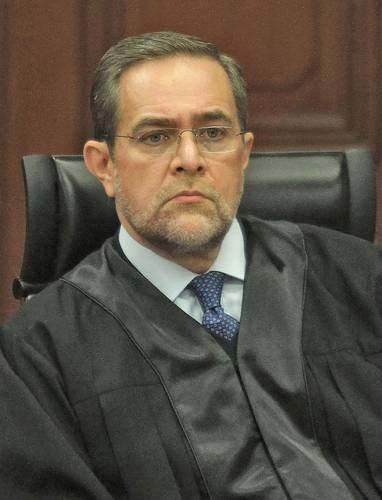▲ The Minister of the Supreme Court of Justice of the Nation Jorge Mario Pardo Rebolledo, in a file image.Photo Maria Luisa Severiano
AND
l last 1st February, Minister Jorge Pardo Rebolledo submitted for the consideration of his peers who make up the Supreme Court of Justice of the Nation (SCJN) the proposal that the question that will be put to citizens on April 10 (as to whether they consider what for loss of confidence
citizen López Obrador should abandon the very honorable position of President of the Republic) should not explain that, if, on the contrary, they continued to trust him, in his government actions and his transformation project, they could express their will that it should continue exercising the Executive Power, expressing this decision by crossing out a grammatical option contrary to the concept of revocation. What do you think, for example: ratification? Minister Pardo considered, however, that including contradictory terms when deciding on any question is inadmissible. By God, Minister Pardo! Now you put me in another dilemma: does your profound legal sense not give you space for elementary common sense?
The question that the robed Pardo Rebolledo wanted to change is the one that will finally prevail in the consultation on April 10, given that the minister did not manage to convince more than six of his peers with his arguments. Those six votes, added to his, did not reach the minimum required to form the qualified majority that, in this case, was required to correct the text through which the will of the citizens on the option would be explored on the date cited. to which, the misnamed mandate revocation law
, encouraged them to choose: do you want López Obrador to continue as President or for the mandate that was granted to him three years ago to be revoked? That is to say, by express way, shall we send it to his ranch? By the way, it is opportune to comment on what the sharp-witted and always well-informed Carlos Marín wrote about it (Tyrians and Trojans say –and some Saltillans, like the typist– that Marín was the non-reporter for Julio Scherer’s magazine Proceso… differentiating between the beginnings and the present.) Well, Don Carlos Marín, with the sarcasm of a widely read columnist, titles his text as follows: Miraculous Court: four is greater than seven
. No, Don Carlos, four is not, it cannot be greater than seven, but yes, seven is slightly less than eight, the minimum number of members of the Supreme Court, which the law stipulates make up the type of majority that, in this and other cases, it is required to make a decision.
Well, with everything and the decision that the SCJN finally took, and that in some way represents an effort to make explicit what the consultation consists of, the approach to the question continues to be confusing, obtuse and even abstruse, as the endearing poet León Felipe would say. (Abstruse are the words that philosophers say and that nobody understands.) The little nuns and the little monks (don’t miss the parity), responsible for my primary studies, taught me the differences between a phrase and a sentence (and what a they taught me sentences) and, of course, also the grammatical parts that make up sentences. The first, of course, is the noun or subject, that is, the person, animal, or thing that performs the action of the verb. The predicate, on the other hand, is what is said of the subject. This does not have to be explicit, to supply it there are pronouns and also the expressions that identify them without the need to name them. Well, I must already be in a stage of galloping senility, but, truth be told, to the question in question, I don’t understand a jot. (This letter was the smallest in Middle Eastern vocabularies, such as Hebrew or Chaldean, thus saying: I don’t understand a jot
expressed absolute incomprehension or ignorance.) Let’s see. After the discussion in the SCJN, in which neither party was able to fix the litis and find a simple, rational, intelligible and brief explanation for the dilemma that with a democratic and egalitarian treatment (“are you (you) in favor of agree…..?”) the INE asks all citizens. I can’t help but wonder (although, as usual, he doesn’t answer me): is this how the gentle councilors Córdova and Murayama would treat the silver and electrical appliance barons on a first-name basis, or would they reverently offer them: Your Excellency, if you wish, we can take the ballot boxes to your mansions.
? The truth is that, after this failed attempt to approach ordinary citizens and, after the annoying and very easily avoidable cacophony of writing at the beginning of the text: Andrés. Did the editors prefer to clarify that the name of Andrés Manuel referred to the President of the United Mexican States, so that no one could be confused, with the president of another United States that was not us?
As usual, I remain indebted to the issues we are discussing, but not entirely: I end with this reflection: a century is a titipuchal of years, but 100 of them, dedicated to learning, to the rational, scientific interpretation of our life and then dedicated to teaching, beginning in the first place with personal life, deserves all respect. Pablo González Casanova is an essential part of our history: of which he testifies to us and of which he is the protagonist. For men like that, 100 years is the beginning.
Twitter: @ortiztejeda








